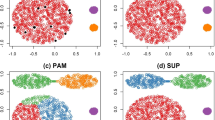Abstract
The Self-Healing Umbrella Sampling (SHUS) algorithm is an adaptive biasing algorithm which has been proposed in Marsili et al. (J Phys Chem B 110(29):14011–14013, 2006) in order to efficiently sample a multimodal probability measure. We show that this method can be seen as a variant of the well-known Wang–Landau algorithm Wang and Landau (Phys Rev E 64:056101, 2001a; Phys Rev Lett 86(10):2050–2053, 2001b). Adapting results on the convergence of the Wang-Landau algorithm obtained in Fort et al. (Math Comput 84(295):2297–2327, 2014a), we prove the convergence of the SHUS algorithm. We also compare the two methods in terms of efficiency. We finally propose a modification of the SHUS algorithm in order to increase its efficiency, and exhibit some similarities of SHUS with the well-tempered metadynamics method Barducci et al. (Phys Rev Lett 100:020,603, 2008).














Similar content being viewed by others
Notes
With the notation of the metadynamics works, what we call here a is denoted \(\varDelta T/(T + \varDelta T)\) where T is the temperature and \(\varDelta T > 0\) is a parameter. The limiting regime \(a = 1\) is recovered in the limit \(\varDelta T \rightarrow +\infty \), which corresponds to the standard metadynamics (Laio and Parrinello 2002; Bussi et al. 2006.
References
Andrieu, C., Moulines, E., Priouret, P.: Stability of stochastic approximation under verifiable conditions. SIAM J. Control Optim. 44, 283–312 (2005)
Barducci, A., Bussi, G., Parrinello, M.: Well-tempered metadynamics: a smoothly converging and tunable free-energy method. Phys. Rev. Lett. 100, 020,603 (2008)
Bussi, G., Laio, A., Parrinello, M.: Equilibrium free energies from nonequilibrium metadynamics. Phys. Rev. Lett. 96, 090,601 (2006)
Chopin, N., Lelièvre, T., Stoltz, G.: Free energy methods for Bayesian inference: efficient exploration of univariate Gaussian mixture posteriors. Stat. Comput. 22(4), 897–916 (2012)
Dama, J., Parrinello, M., Voth, G.: Well-tempered metadynamics converges asymptotically. Phys. Rev. Lett. 112, 240,602(1-6) (2014)
Dickson, B., Legoll, F., Lelièvre, T., Stoltz, G., Fleurat-Lessard, P.: Free energy calculations: an efficient adaptive biasing potential method. J. Phys. Chem. B 114, 5823–5830 (2010)
Fort, G.: Central limit theorems for stochastic approximation with controlled Markov chain dynamics. ESAIM: Probab. Stat. 19, 60–80 (2015)
Fort, G., Jourdain, B., Kuhn, E., Lelièvre, T., Stoltz, G.: Convergence of the Wang-Landau. Math. Comput. 84(295), 2297–2327 (2014a)
Fort, G., Jourdain, B., Kuhn, E., Lelièvre, T., Stoltz, G.: Efficiency of the Wang-Landau algorithm: a simple test case. Appl. Math. Res. Express 2014(2), 275–311 (2014b)
Fort, G., Moulines, E., Priouret, P.: Convergence of adaptive and interacting Markov chain Monte Carlo algorithms. Ann. Stat. 39(6), 3262–3289 (2012)
Hall, P., Heyde, P.: Martingale Limit Theory and its Application. Academic Press, New York (1980)
Hastings, W.K.: Monte Carlo sampling methods using Markov chains and their applications. Biometrika 57, 97–109 (1970)
Jacob, P.E., Ryder, R.J.: The Wang-Landau algorithm reaches the flat histogram criterion in finite time. Ann. Appl. Probab. 24(1), 34–53 (2014)
Laio, A., Parrinello, M.: Escaping free-energy minima. Proc. Natl. Acad. Sci. USA 99, 12562–12566 (2002)
Lelièvre, T.: Two mathematical tools to analyze metastable stochastic processes. In: Cangiani, A., Davidchack, R.L., Georgoulis, E., Gorban, A.N., Levesley, J., Tretyakov, M.V. (eds.) Numerical Mathematics and Advanced Applications 2011, pp. 791–810. Springer, Berlin (2013)
Lelièvre, T., Rousset, M., Stoltz, G.: Free Energy Computations: A Mathematical Perspective. Imperial College Press, London (2010)
Marinari, E., Parisi, G.: Simulated tempering—a new Monte-Carlo scheme. Europhys. Lett. 19(6), 451–458 (1992)
Marsili, S., Barducci, A., Chelli, R., Procacci, P., Schettino, V.: Self-healing umbrella sampling: a non-equilibrium approach for quantitative free energy calculations. J. Phys. Chem. B 110(29), 14011–14013 (2006)
Mengersen, K., Robert, C.: IID sampling with self-avoiding particle filters: the pinball sampler. In: Bernardo, J., David, A., Berger, J., West, M. (eds.) Bayesian Statistics 7 (2003)
Metropolis, N., Rosenbluth, A.W., Rosenbluth, M.N., Teller, A.H., Teller, E.: Equations of state calculations by fast computing machines. J. Chem. Phys. 21(6), 1087–1091 (1953)
Park, S., Sener, M.K., Lu, D., Schulten, K.: Reaction paths based on mean first-passage times. J. Chem. Phys. 119(3), 1313–1319 (2003)
Polyak, B.T., Juditsky, A.B.: Acceleration of stochastic approximation by averaging. SIAM J. Control Optim. 30(4), 838–855 (1992)
Roberts, G.O., Tweedie, R.L.: Exponential convergence of Langevin distributions and their discrete approximations. Bernoulli 2(4), 341–363 (1996)
Wang, F., Landau, D.: Determining the density of states for classical statistical models: a random walk algorithm to produce a flat histogram. Phys. Rev. E 64, 056101 (2001a)
Wang, F.G., Landau, D.P.: Efficient, multiple-range random walk algorithm to calculate the density of states. Phys. Rev. Lett. 86(10), 2050–2053 (2001b)
Acknowledgments
This work is supported by the European Research Council under the European Union’s Seventh Framework Programme (FP/2007-2013) / ERC Grant Agreement number 614492 and by the French National Research Agency under the grants ANR-12-BS01-0019 (STAB) and ANR-14-CE23-0012 (COSMOS). We also benefited from the scientific environment of the Laboratoire International Associé between the Centre National de la Recherche Scientifique and the University of Illinois at Urbana-Champaign.
Author information
Authors and Affiliations
Corresponding author
Rights and permissions
About this article
Cite this article
Fort, G., Jourdain, B., Lelièvre, T. et al. Self-healing umbrella sampling: convergence and efficiency. Stat Comput 27, 147–168 (2017). https://doi.org/10.1007/s11222-015-9613-2
Received:
Accepted:
Published:
Issue Date:
DOI: https://doi.org/10.1007/s11222-015-9613-2



